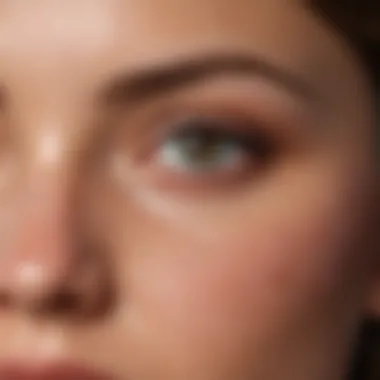Effective Strategies to Eliminate Stubborn Hard Pimples: A Comprehensive Guide


Well-Being Overview:
To begin our exploration into how to get rid of a hard pimple, it is vital to understand the significance of addressing such skin issues. Hard pimples can be stubborn and challenging to eliminate, impacting not only our physical appearance but also our self-confidence and overall well-being. Focusing on skincare routines and seeking expert advice from dermatologists can offer valuable insights into effectively tackling these persistent skin concerns.
Physical Wellness
When it comes to targeting hard pimples, implementing a holistic approach that encompasses physical wellness is crucial. Regular physical activity, such as engaging in suitable exercise routines, plays a significant role in promoting healthy skin. Pairing exercise with healthy eating habits can further enhance skin health, as nourishing our bodies with nutrient-rich foods can support skin regeneration and repair.
Mindfulness & Self-Care Practices
In the pursuit of clearer skin, incorporating mindfulness techniques and self-care practices can be remarkably beneficial. Mindfulness not only helps reduce stress levels but also promotes overall well-being, which can reflect positively on the skin. Establishing self-care rituals for rejuvenation and finding a balance between work commitments and relaxation can contribute to a healthier mindset and improved skin condition.
Nutrition for Nourishment
The role of nutrition in skincare cannot be understated. Consuming a balanced diet rich in essential nutrients is fundamental for supporting skin health and combating hard pimples. Incorporating nutrient-dense foods into your meals can provide the skin with the tools it needs to repair and maintain its resilience. By exploring easy and healthy recipes, individuals can optimize their nutritional intake and contribute to clearer, healthier skin.
Understanding Hard Pimples
In the realm of skincare, delving into the intricacies of hard pimples proves to be an essential pursuit. Hard pimples pose a unique challenge, requiring specific strategies for effective treatment and prevention. This section serves as the cornerstone of the ultimate guide, providing in-depth insights into the nature of hard pimples and the various approaches to combat them.
What Are Hard Pimples?
Difference from regular acne
When exploring the landscape of hard pimples, delineating their dissimilarity from regular acne emerges as a pivotal aspect. The key characteristic that sets hard pimples apart lies in their dense, solid structure beneath the skin's surface. Unlike conventional acne, which often manifests as inflamed lesions on the skin's outer layer, hard pimples form deep-seated, stubborn blemishes that can be challenging to eradicate. This distinction underscores the importance of tailored treatment methods specifically designed to address the unique nature of hard pimples, making it a crucial focal point for this comprehensive guide.
Causes of hard pimples
Unearthing the underlying causes of hard pimples sheds light on the factors contributing to their formation. Various triggers, including excess sebum production, hormonal fluctuations, and bacterial proliferation, play a role in the development of these resilient blemishes. Understanding the intricate interplay of these causal agents provides crucial context for devising effective treatment and prevention strategies. By dissecting the origins of hard pimples, individuals can gain valuable insights into mitigating their occurrence and promoting healthier skin habits, making this exploration a pertinent inclusion in the ultimate guide.
Identifying Hard Pimples


Characteristics of hard pimples
Examining the distinct characteristics exhibited by hard pimples offers critical clues for accurate identification. These blemishes typically manifest as small, raised nodules beneath the skin's surface, devoid of a visible center or a pus-filled top. Their firm texture and lack of quick resolution differentiate them from other types of acne, necessitating targeted care approaches. Recognizing these defining features equips individuals with the ability to differentiate hard pimples from other skin issues, enabling them to tailor their skincare regimen accordingly. This nuanced understanding is vital for effective management and treatment, making it an indispensable topic in this holistic guide.
Common locations on the face
Hard pimples exhibit a predilection for specific facial regions, with common sites including the chin, jawline, and forehead. The tendency of these blemishes to appear in clustered areas on the face underscores the significance of identifying their prevalent locations. By familiarizing oneself with the typical distribution of hard pimples, individuals can proactively address emerging concerns and implement targeted prevention strategies for these trouble spots. Understanding the favored facial sites for hard pimples empowers individuals to adopt a proactive stance towards skincare, enhancing their ability to maintain clear, healthy skin and combat stubborn blemishes effectively. This nuanced exploration of common facial locations enriches the reader's comprehension, offering practical insights for navigating the complexities of hard pimple management within the context of this definitive guide.
Prevention Techniques
Prevention techniques play a vital role in addressing hard pimples effectively. By incorporating proactive strategies into your skincare routine, you can minimize the occurrence of stubborn pimples. Consistency is key when it comes to prevention techniques, as establishing a regular routine can help maintain skin health and prevent future breakouts. Understanding the specific causes of hard pimples is essential in tailoring prevention methods to individual needs. This section will delve into skincare practices and dietary considerations that can aid in preventing hard pimples.
Skincare Practices
Importance of cleansing
Cleansing is a fundamental step in any skincare regimen, particularly for combating hard pimples. Regularly cleansing the skin helps remove impurities, excess oil, and bacteria that can clog pores and lead to breakouts. Using a gentle cleanser suited for your skin type can effectively prevent the accumulation of dirt and oil, reducing the risk of developing hard pimples. Proper cleansing also prepares the skin to better absorb subsequent skincare products, maximizing their effectiveness.
Choosing non-comedogenic products
Opting for non-comedogenic products is crucial in preventing hard pimples. These products are specifically formulated not to clog pores, reducing the likelihood of breakouts, including hard pimples. Non-comedogenic products are lightweight and breathable, making them suitable for all skin types, especially oily and acne-prone skin. By selecting non-comedogenic skincare products, individuals can maintain clear and healthy skin without exacerbating existing skin issues.
Dietary Considerations
Impact of diet on skin health
The influence of diet on skin health cannot be overstated in the context of tackling hard pimples. Consuming a balanced diet rich in essential nutrients, vitamins, and antioxidants can promote skin renewal and regeneration, combating the occurrence of hard pimples. A diet high in processed foods, sugars, and unhealthy fats may contribute to skin inflammation and hormonal imbalances, potentially triggering hard pimples. By prioritizing a diet consisting of fruits, vegetables, lean proteins, and whole grains, individuals can support optimal skin health and reduce the risk of developing stubborn pimples.
Foods that may trigger hard pimples
Certain foods have been linked to exacerbating acne, including hard pimples. Dairy products, high-glycemic foods, and foods rich in saturated fats are known culprits that may trigger inflammatory responses in the skin, leading to the formation of hard pimples. By monitoring dietary intake and identifying potential trigger foods, individuals can make informed choices to minimize the impact of these factors on skin health. Incorporating anti-inflammatory foods such as fish, nuts, and leafy greens can help mitigate the risk of hard pimples and promote clear, radiant skin.


Home Remedies for Hard Pimples
In the realm of skincare and combating obstinate hard pimples, home remedies stand out as a valuable resource deserving meticulous exploration. These remedies encompass natural solutions that can help address challenging skin issues effectively. When it comes to hard pimples, a multifaceted approach is crucial, and home remedies play a significant role in this process. By incorporating home remedies into a skincare routine, individuals can take proactive steps towards achieving clearer and healthier skin.
Natural Treatments
Tea tree oil
When delving into the realm of natural treatments for hard pimples, tea tree oil emerges as a prominent contender. Renowned for its antibacterial and anti-inflammatory properties, tea tree oil offers a natural alternative for targeting stubborn pimples. Its effectiveness in combating acne-causing bacteria while soothing inflammation makes it a sought-after ingredient in various skincare products. Despite its potent nature, tea tree oil should be used judiciously, as some individuals may experience skin sensitivities.
Honey and cinnamon mask
Another compelling natural treatment is the honey and cinnamon mask, known for its antibacterial and antioxidant properties. This mask not only helps tackle hard pimples but also aids in rejuvenating the skin and promoting a more radiant complexion. The combination of honey and cinnamon creates a potent treatment that can assist in reducing inflammation, combating bacteria, and enhancing overall skin health. As with any topical application, it is essential to perform a patch test to ascertain skin compatibility before widespread use.
Topical Applications
Benzoyl peroxide
Amid the array of topical applications for hard pimples, benzoyl peroxide stands out for its efficacy in targeting acne-causing bacteria and reducing excess oil production. As a common ingredient in acne treatments, benzoyl peroxide works by unclogging pores and preventing further breakouts. Its drying effect can aid in diminishing existing pimples and preventing new ones from forming. However, individuals with sensitive skin should exercise caution when using benzoyl peroxide, as it may cause dryness or irritation.
Salicylic acid
Equally notable is salicylic acid, renowned for its exfoliating properties and ability to penetrate follicles, effectively removing excess oil and dead skin cells. By promoting cell turnover and preventing pore blockages, salicylic acid plays a vital role in tackling hard pimples. Its anti-inflammatory attributes further contribute to reducing redness and swelling associated with acne. While generally well-tolerated, individuals with sensitive skin should introduce this ingredient gradually to prevent potential irritation.
Professional Interventions
In the realm of combatting hard pimples, professional interventions stand as robust solutions that go beyond the scope of home remedies. Their significance in addressing stubborn skin issues cannot be overstated. These interventions come into play when conventional methods fall short, offering targeted treatments that require the expertise of dermatologists. By venturing into dermatological procedures and prescription medications, individuals gain access to specialized care that hones in on the root causes of hard pimples with precision.
Dermatological Procedures
Extraction Techniques


Extraction techniques wield a powerful role in the battle against hard pimples. These procedures involve the skilled removal of sebum, debris, and bacteria from clogged pores, accelerating the healing process and preventing further inflammation. The key characteristic of extraction techniques lies in their immediate efficacy in unclogging pores, reducing the size and redness of hard pimples. While extraction techniques are a popular choice for their ability to deliver quick results, overuse can lead to skin irritation or scarring. Despite this, their precise nature and rapid impact make them a valuable tool in the arsenal of dermatological treatments for hard pimples.
Intralesional Corticosteroid Injections
Intralesional corticosteroid injections offer a targeted approach to treating hard pimples by delivering anti-inflammatory medication directly into the affected area. This method reduces swelling, redness, and pain associated with hard pimples, aiding in their swift resolution. The unique feature of these injections lies in their ability to provide localized treatment without affecting the rest of the body. While highly effective, intralesional corticosteroid injections may carry risks such as skin atrophy or hypopigmentation. Their advantages in addressing hard pimples efficiently make them a sought-after choice in dermatological practice.
Prescription Medications
Retinoids
Retinoids play a crucial role in the management of hard pimples by regulating skin cell turnover and preventing the formation of acne lesions. Their key characteristic lies in their ability to unclog pores, reduce inflammation, and promote overall skin rejuvenation. While retinoids are known for their efficacy in treating acne, they may cause initial irritation and heightened sensitivity to sunlight. Despite these considerations, the unique feature of retinoids in targeting multiple factors contributing to hard pimples makes them a valuable addition to the treatment regimen.
Oral Antibiotics
Oral antibiotics are prescribed for hard pimples when bacterial infection plays a significant role in their development. By combating the underlying bacteria, oral antibiotics help alleviate inflammation and prevent the spread of infection. The key characteristic of oral antibiotics is their systemic approach to treating hard pimples, reaching deep-seated infections that topical treatments may not address effectively. However, prolonged use of oral antibiotics can lead to antibiotic resistance and digestive upset. Despite these drawbacks, their ability to tackle severe cases of hard pimples underscores their importance in dermatological care.
Lifestyle Adjustments
The Lifestyle Adjustments section in this article plays a crucial role in addressing hard pimples. Lifestyle factors such as stress management and sleep hygiene have a significant impact on skin health. By incorporating the right adjustments into your daily routine, you can potentially improve your skin condition. The relevance of focusing on Lifestyle Adjustments lies in the holistic approach it offers towards skin care.
Stress Management
Impact of stress on skin
Stress has been identified as a key contributor to skin issues, including the development of hard pimples. The Impact of stress on skin is a crucial aspect to consider when seeking to address challenging skin conditions. Stress can trigger hormonal imbalances and inflammation, leading to worsened skin problems. Understanding how stress affects skin is essential for developing effective treatment strategies.
Relaxation techniques
Incorporating relaxation techniques into your daily routine can significantly improve skin health. Relaxation techniques help in reducing stress levels, which, in turn, can aid in preventing breakouts and promoting skin clarity. The key characteristic of Relaxation techniques lies in their ability to promote overall well-being and reduce the impact of stress on the skin. By incorporating relaxation practices like meditation, deep breathing, or yoga, individuals can experience better skin health and a more radiant complexion.
Sleep Hygiene
Connection between sleep and skin health
The connection between sleep and skin health is profound. Adequate sleep plays a vital role in skin regeneration and repair. Poor sleep patterns can disrupt the skin's natural healing processes, leading to increased susceptibility to skin issues like hard pimples. Understanding the Connection between sleep and skin health is crucial for maintaining healthy skin and addressing persistent skin problems.
Improving sleep patterns
Improving sleep patterns is essential for promoting overall skin health. Quality sleep allows the skin to rejuvenate, repair, and maintain its natural balance. By prioritizing good sleep hygiene practices, such as maintaining a regular sleep schedule, creating a restful sleep environment, and avoiding stimulants before bedtime, individuals can enhance skin regeneration and reduce the occurrence of hard pimples. The unique feature of Improving sleep patterns is its ability to optimize the skin's nightly repair processes, resulting in a more vibrant and healthier complexion.



